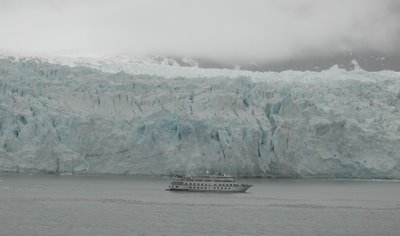


Over two hundred years ago Captain George Vancouver sailed down the Pacific Coast and turned east, searching for the Northwest Passage. While Vancouver remained behind, ill in his cabin, First Officer Joseph Whidbey lowered a boat and set out to survey the area. Pushing through the masses of floating ice, they made their way into a large open bay, blocked at its northern end by a great ice wall. This was the first descrption we have of Glacier Bay. By the late 1800's the massive ice glacier that filled what we know now as Glacier Bay had retreated 50 miles, opening up a brand new waterway. Few visitors, other than the Tlingit people, who hunted seal from temporary camps along the shore had seen this new world.
The first to bring it to the attention of the outside world was a man well-known for his adventerous spirit. In 1879 John Muir rode a steamer up from Seattle to the little town of Wrangell, where he hired a canoe and four native paddlers to take him north. From a vast wilderness of ice nearly a mile thick, the bay has emerged, now 65 miles long and filled with fjords and inlets. This park's 3.3 million acres were included in an international Biosphere Reserve, as well as a World Heritage Site that incorporates Wrangell-St. Elias National Park and Kluane National Park and the Tatshenshini-Alesk Provincial Park in Canada.
On Tuesday, May 9th the Westerdam entered Chatham straight to the Cornwallis Pilot Station. With the pilots on board, we then continued north through Chatham Strait. This led us to Icy Strait which was first navigated by Captain Vancouver. We then sailed to the north of Sister's Island towards Glacier Bay. On entering Glacier Bay we picked up the Glacier Bay Park Rangers at 11am in Bartlett Cove. We then toured past Reid and Lamplugh Glaciers and held position off the spectacular Grand Pacific and Margerie Glaciers. The Grand Pacific had a calving while we were there and here are pictures of this Glacier. We were so close to the Glaciers I thought they would collapse on us, but of course, this did not happen. There were blooms of boiling water around the glacier and icebergs with gulls riding them,all around our ship.
As for global warming, it is difficult to get a sense of it in this part of the world since I have never seen this area until now. Global warming seems more evident to me from being subjected to so many violent hurricanes in the last few years and the generally more extreme and violent weather all around the lower 48.
I think I like the movies "Water World" and "The Fire Next Time" because they seem so likely to happen in the not too distant future. "The Fire Next Time"even begins with the destruction of New Orleans by a massive hurricane. People in the movie migrated north to Canada which was temperate and difficult to get into because they only took the very privileged. The area around the Mississippi had become an unliveable desert. If you read the CIA website, as I
often do, you discover that they believe that conflict over fresh water will be one of the great divisive issues on the planet in the future.
If all this ice melts from global warming, perhaps we will become a water world with only the tip of Mount Everest to be "dry land." It is more likely that coastal real estate will disappear and many of us will migrate north as the climate warms and the equatorial part of the world gets hotter. This has always seemed like a good reason to emigrate to Canada. Sometimes I wish my son would plan this for his own future because I truly do think that places like Florida will become unliveable in the very near future.
No comments:
Post a Comment